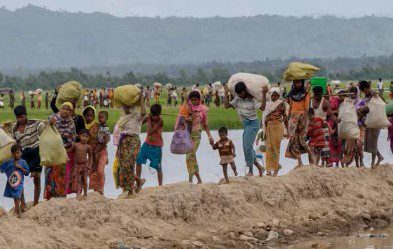The United Nations has reported that nearly 150,000 new Rohingya people have fled to Bangladesh over the past 18 months due to ongoing violence and persecution in Rakhine state of Myanmar.
The UN has also warned that due to various crises, healthcare services in the Rohingya camps might be suspended between July and September, and food aid could be completely halted by December.
This information was disclosed at a press release issued by the UN Refugee Agency (UNHCR) on Friday.
According to the statement, this marks the highest influx of Rohingya into Bangladesh since the mass exodus of over 750,000 in 2017.
The majority of the newly arrived refugees are women and children. As of June, biometric registration has identified 121,000 of these new arrivals, though many remain unregistered despite residing in the camps.
UNHCR noted that with nearly one million Rohingya living in just 24 square kilometres in Cox’s Bazar, the area has become one of the most densely-populated refugee camps in the world.
The arrival of more refugees is placing extreme pressure on existing support systems.
The new arrivals are heavily dependent on the earlier Rohingya residents for food, healthcare, education, and shelter.
The statement also highlighted that funding shortfalls among donor groups are already disrupting critical services.
The UN warned that healthcare services may be halted between July and September, and food aid might cease entirely by December.
The press release also noted that such a crisis would leave 230,000 Rohingya children without access to education.
As a result, frustration, insecurity, and uncertainty are growing within the camps. Many Rohingya are attempting dangerous sea journeys in search of a better life elsewhere.
Under these circumstances, UNHCR has called for the continuation of life-saving aid for the Rohingya until peace and stability are restored in Rakhine State.


